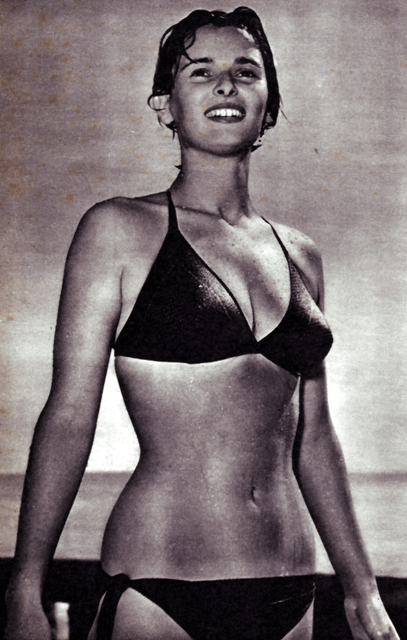Lucia Bosè

Lucia Bosè

Lucia Bosè | |
|---|---|
| Born | Lucia Borloni (1931-01-28)28 January 1931 |
| Occupation | Actress |
| Years active | 1950–present |
| Spouse(s) | Luis Miguel Dominguín (1955–1967) |
| Children | Miguel Bosé Lucía Dominguín Paola Dominguín |
| Parent(s) | Domenico Bosè Francesca Borloni |
Lucia Bosè , real surname Borloni, (born 28 January 1931) is an Italian actress, who was at the height of her fame during the period of Italian Neorealism, the 1940s and 1950s. She is the mother of Spanish singer Miguel Bosé.
Lucia Bosè | |
|---|---|
| Born | Lucia Borloni (1931-01-28)28 January 1931 |
| Occupation | Actress |
| Years active | 1950–present |
| Spouse(s) | Luis Miguel Dominguín (1955–1967) |
| Children | Miguel Bosé Lucía Dominguín Paola Dominguín |
| Parent(s) | Domenico Bosè Francesca Borloni |
Life and career
After a number of years working in a bakery, Pasticceria Galli, in her native city, in 1947 she won the second edition of Miss Italia beauty contest.[1] Later she acted in Dino Risi’s short The Five days of Milan, then, in 1950 she made her big screen debut in Giuseppe De Santis’ Non c'è pace tra gli ulivi (No Peace under the Olive Tree). The same year, she gave a performance as Paola Molon in Antonioni's Cronaca di un amore. In 1953, Michelangelo Antonioni asked her to play Clara Manni in La signora senza camelie and Juan Antonio Bardem cast her in the lead of Muerte de un ciclista (1955). She also appeared in the 1955 film Gli Sbandati and played the main female role in Luis Buñuel's Cela s'appelle l'aurore, 1956.
Her career had flourished until 1956 afther the filming of Muerte de un ciclista,[2] when she married Spanish bullfighter Luis Miguel González Lucas, and gave up acting in order to raise their children, Miguel and Paola.[3] They married twice, first in Las Vegas and the second once at the family finca.[4] They broke up five months later.[5] In 1960 she eventually played an uncredited role in Jean Cocteau's Le testament d'Orphée, ou ne me demandez pas pourquoi! and then returned to the screen in the late 1960s, appearing in Fellini's Fellini Satyricon (1969) and starring in the Taviani Brothers' Under the Sign of Scorpio (1969), Mario Colucci's Something Creeping in The Dark (1971), Liliana Cavani's L'ospite (1972), Giulio Questi's Arcana (1972), Marguerite Duras' Nathalie Granger (1972), Beni Montresor's La messe dorée (1975), Jeanne Moreau's Lumière (1976) and Daniel Schmid's Violanta (1976). She has continued to be active in Italian and Spanish films, appearing in Francesco Rosi's Cronaca di una morte annunciata (1987), Agustí Villaronga's El niño de la luna (1989), Ferzan Özpetek's Harem suaré (1999) and Roberto Faenza's I vicerè (2007).
Selected filmography
Under the Olive Tree (1950)
Story of a Love Affair (1950)
Paris Is Always Paris (1951)
È l'amor che mi rovina (1951)
Three Girls from Rome (1952)
The Temptress (1952)
Rome 11:00 (1952)
The Lady Without Camelias (1953)
Of Life and Love (1954)
It Happened at the Police Station (1954)
Era lei che lo voleva! (1954)
Concert of Intrigue (1954)
Symphony of Love (1954)
Magic Village (1955)
The Abandoned (1955)
Death of a Cyclist (1955)
*Cela s'appelle l'aurore * (1956)
Testament of Orpheus (1960)
Nocturne 29 (1968)
The Picasso Summer (1969)
Fellini Satyricon (1969)
Love and Other Solitudes (1969)
Jutrzenka (1969)
Metello (1970)
So Long Gulliver (1970)
The House of the Doves (1972)
Nathalie Granger (1972)
Down the Ancient Stairs (1975)
Violanta (1976)